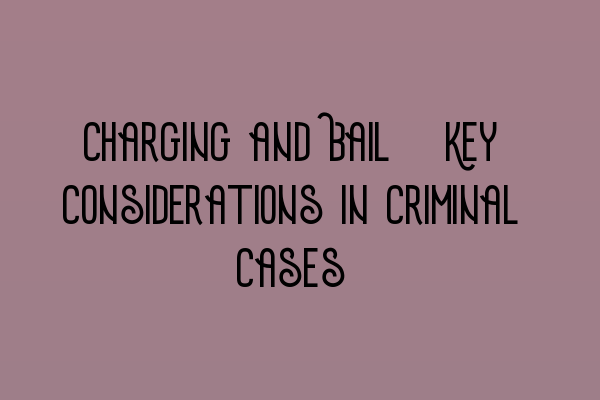Charging and Bail: Key Considerations in Criminal Cases
Welcome to the SQE Criminal Law & Practice Law UK blog! In this article, we will explore the essential aspects of charging and bail in criminal cases. Understanding these key considerations is crucial for aspiring solicitors and legal professionals. Let’s dive in!
Charging in Criminal Cases
When it comes to criminal cases, charging is the formal process through which an individual is accused of committing a crime. It involves the prosecutor levying charges against the defendant based on the evidence and legal framework surrounding the case.
Prosecutors play a vital role in charging, as they must carefully assess the available evidence and determine if it is sufficient to support the charges being brought. They must consider the seriousness of the offense, the likelihood of success at trial, and the interests of justice.
In this context, it’s crucial for solicitors to understand the various types of charges and their implications on the legal process. Offenses can range from minor misdemeanors to serious felonies, each carrying different penalties and repercussions.
For a comprehensive guide on the SQE exam and essential study materials, check out our SQE Exam Prep: Essential Study Materials for Aspiring Solicitors article.
Bail in Criminal Cases
Once an individual has been charged with a crime, the next consideration is whether they will be granted bail or held in custody pending trial. Bail is a legal mechanism that allows defendants to be released from custody while ensuring their appearance at future court proceedings.
The decision to grant bail is made based on various factors, including the seriousness of the offense, the defendant’s criminal record, the likelihood of reoffending, and the risk of flight. Bail conditions may be imposed to mitigate these risks, such as reporting to a police station regularly or surrendering travel documents.
Solicitors must advocate for their clients’ best interests when it comes to bail applications, presenting compelling arguments to support their release. A thorough understanding of the applicable legislation and relevant case law is essential for building strong bail applications.
For more information on the Solicitors Qualifying Examination format and how to navigate this important milestone, read our article on Demystifying the Solicitors Qualifying Examination Format.
Conclusion
Charging and bail are critical components of criminal cases, and solicitors must be well-versed in the legal principles surrounding them. By understanding the different types of charges and their implications, as well as advocating for their clients’ best interests during bail applications, solicitors can effectively navigate the criminal justice system.
To learn more about the challenges and success strategies for international lawyers taking the SQE exam, check out our article on SQE Exam for International Lawyers: Challenges and Success Strategies.
Whether you’re an aspiring solicitor or an established legal professional, staying updated on key legal topics is crucial. For a step-by-step guide on LLC formation for UK entrepreneurs, take a look at our articles on LLC Formation Made Simple: Step-by-Step Guide for UK Entrepreneurs and LLC Formation: A Step-by-Step Guide for UK Entrepreneurs.
Thank you for reading this blog post! We hope you found it informative and valuable. Stay tuned for more insights and updates on criminal law and practice in the UK.
